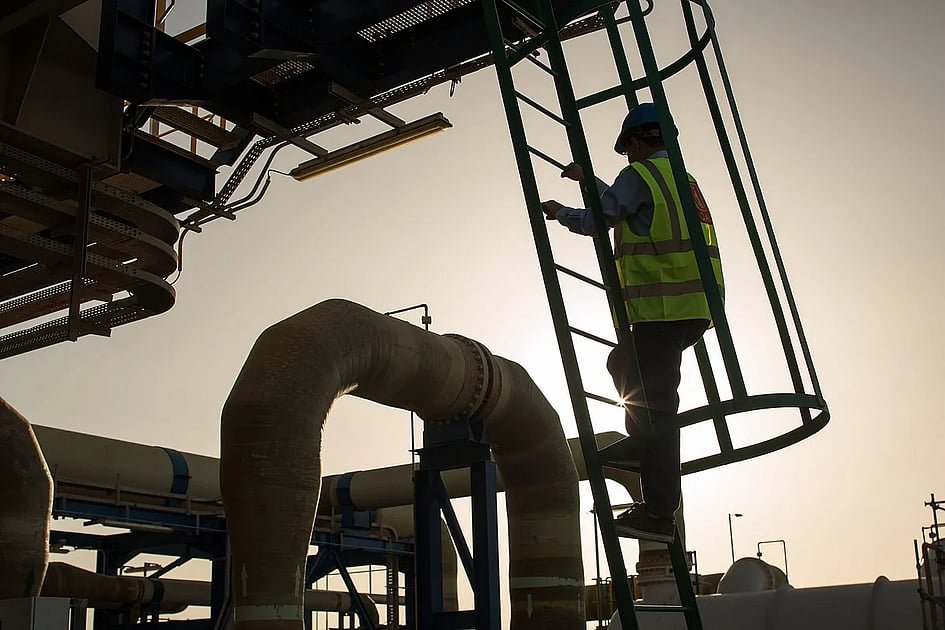Abu Dhabi National Energy Company (Taqa), one of the largest listed integrated utilities in Europe, the Middle East and Africa, has reported a net income of Dh3.7 billion in the first half of 2025, reflecting its continued strength in core utilities and a growing international footprint despite market headwinds.
The group recorded a 4.5 per cent year-on-year increase in revenue to Dh28.4 billion in the six months ended 30 June 2025, driven mainly by higher pass-through costs in its Transmission and Distribution segment. Underlying profitability in its utilities business remained robust, although overall results were weighed down by an expected decline in oil and gas production following the cessation of output from four UK assets, softer oil prices, higher financing costs and non-recurring items. Ebitda fell 11 per cent to Dh10.2 billion.
In Central Asia, Taqa, alongside Mubadala, completed the acquisition of the 875MW Talimarjan power complex in Uzbekistan, marking its entry into one of the region’s fastest-growing energy markets. In the UK, Taqa Transmission continued integrating the recently acquired Transmission Investment, which manages about Dh15 billion (£3 billion) in assets across 11 offshore transmission projects, strengthening its role in critical grid expansion to support the energy transition.
In the Netherlands, Taqa transferred its P18-A gas platform and associated assets to Porthos, supporting Europe’s first major carbon capture and storage facility. Meanwhile, in Greece, Masdar — in which Taqa is a stakeholder — expanded its presence by acquiring 100 per cent of TERNA Energy, a leading renewable developer. Masdar also issued a $1 billion green bond under its Green Finance Framework to fund new renewable projects, underscoring its goal of achieving 100GW of global renewable capacity by 2030.
Domestically, Taqa continued to enhance capacity and flexibility in the UAE’s energy infrastructure. In partnership with EWEC, it signed a Power Purchase Agreement to convert the Shuweihat 1 plant from a cogeneration facility to a flexible reserve power plant, enabling greater integration of renewables into Abu Dhabi’s grid and improving stability during peak demand. This followed the earlier agreement for the 1GW Al Dhafra Thermal project, designed to supply additional dispatchable capacity to meet rising electricity demand from artificial intelligence and digital infrastructure.
Chairman Mohamed Hassan Alsuwaidi said in a statement that Taqa’s first-half performance highlighted its role as a key enabler of infrastructure development both in the UAE and internationally. “Alongside sustained investment in domestic power and water infrastructure, our growing international presence, including our plans in Morocco, reinforces Taqa’s commitment to providing reliable, efficient power and water supply at scale,” he said. “As the business evolves, our focus remains on disciplined execution and creating lasting value for shareholders, while supporting the broader energy transition and economic diversification goals of the UAE and the markets we operate in.”
Group CEO and managing director Jasim Husain Thabet said the results reflected the resilience of Taqa’s integrated utility model. “Despite headwinds, we continued to make tangible progress on priority projects across generation, water and transmission, increasing system flexibility and expanding our global portfolio. These steps reinforce Taqa’s position as a reliable partner for large-scale power and water solutions, regionally and globally,” he said.
The group reduced its gross debt to Dh61.7 billion through scheduled repayments and the maturity of a corporate bond, while directing Dh5.2 billion in capital expenditure towards flexible generation, transmission upgrades and strategic desalination projects. The Board approved a second-quarter interim dividend of 0.75 fils per share.
Taqa said it would maintain its focus on expanding low-carbon power and water solutions, strengthening grid infrastructure and enabling the energy transition in its markets.
